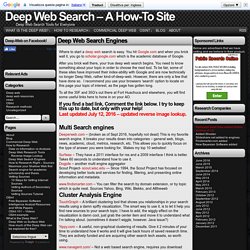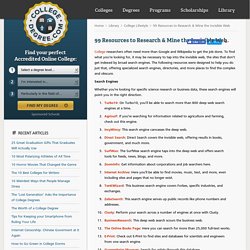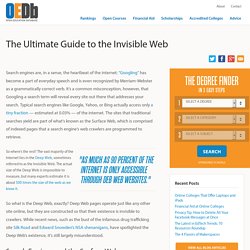

Deep Web Search - A How-To Site. Where to start a deep web search is easy.

You hit Google.com and when you brick wall it, you go to scholar.google.com which is the academic database of Google. After you brick wall there, your true deep web search begins. You need to know something about your topic in order to choose the next tool. To be fair, some of these sites have improved their index-ability with Google and are now technically no longer Deep Web, rather kind-of-deep-web. However, there are only a few that have done so. To all the 35F and 35G’s out there at Fort Huachuca and elsewhere, you will find some useful links here to hone in on your AO. If you find a bad link, Comment the link below. Last updated July 12, 2016 – updated reverse image lookup. Multi Search engines Deeperweb.com – (broken as of Sept 2016, hopefully not dead) This is my favorite search engine. Surfwax – They have a 2011 interface for rss and a 2009 interface I think is better.
Cluster Analysis Engine. Deepweb. Lec18. 100 Search Engines For Academic Research. Back in 2010, we shared with you 100 awesome search engines and research resources in our post: 100 Time-Saving Search Engines for Serious Scholars.

It’s been an incredible resource, but now, it’s time for an update. Some services have moved on, others have been created, and we’ve found some new discoveries, too. Many of our original 100 are still going strong, but we’ve updated where necessary and added some of our new favorites, too. Check out our new, up-to-date collection to discover the very best search engine for finding the academic results you’re looking for.
General Need to get started with a more broad search? iSEEK Education:iSeek is an excellent targeted search engine, designed especially for students, teachers, administrators, and caregivers. Meta Search Want the best of everything? Dogpile:Find the best of all the major search engines with Dogpile, an engine that returns results from Google, Yahoo! Databases and Archives Books & Journals Science Math & Technology Social Science. PDF search engine for free scientific publications - FreeFullPDF. 99 Resources to Research & Mine the Invisible Web.
College researchers often need more than Google and Wikipedia to get the job done.

To find what you're looking for, it may be necessary to tap into the invisible web, the sites that don't get indexed by broad search engines. The following resources were designed to help you do just that, offering specialized search engines, directories, and more places to find the complex and obscure. Search Engines Whether you're looking for specific science research or business data, these search engines will point you in the right direction. Turbo10: On Turbo10, you'll be able to search more than 800 deep web search engines at a time. Databases Tap into these databases to access government information, business data, demographics, and beyond.
GPOAccess: If you're looking for US government information, tap into this tool that searches multiple databases at a time. Catalogs. The Invisible Web: What It Is and How You Can Find It. By Wendy Boswell Updated June 02, 2016.

What is the Invisible Web? The term "invisible web" mainly refers to the vast repository of information that search engines and directories don't have direct access to, like databases. Unlike pages on the visible Web (that is, the Web that you can access from search engines and directories), information in databases is generally inaccessible to the software spiders and crawlers that create search engine indexes.
How Big is the Invisible Web? The Invisible Web is estimated to be literally thousands of times larger than the Web content found with general search engine queries. The major search engines - Google, Yahoo, Bing - don't bring back all the "hidden" content in a typical search, simply because they can't see that content without specialized search parameters and/or search expertise. continue reading below our video Why Is It Called "The Invisible Web"? Spiders meander throughout the Web, indexing the addresses of pages they discover. Humanities. The Ultimate Guide to the Invisible Web. Search engines are, in a sense, the heartbeat of the internet; “Googling” has become a part of everyday speech and is even recognized by Merriam-Webster as a grammatically correct verb.

It’s a common misconception, however, that Googling a search term will reveal every site out there that addresses your search. Typical search engines like Google, Yahoo, or Bing actually access only a tiny fraction — estimated at 0.03% — of the internet. The sites that traditional searches yield are part of what’s known as the Surface Web, which is comprised of indexed pages that a search engine’s web crawlers are programmed to retrieve. "As much as 90 percent of the internet is only accessible through deb web websites. " So where’s the rest?